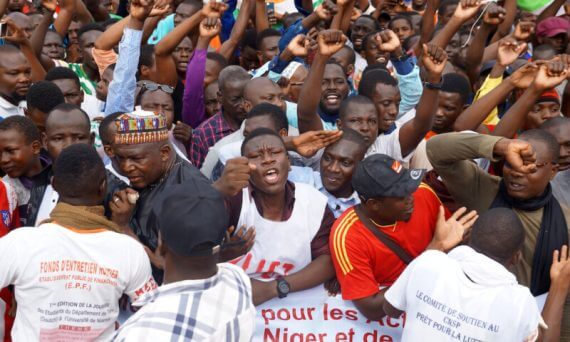W
est Africa is a region that has been plagued by coups since 2020. The most recent coup was in Niger on July 26, 2023. In 1900, Niger was a military zone administered by France. In 1946, it became a French overseas territory and since 1960, it has existed as a “fully independent” state in the international system. Since independence, Niger has suffered four coups d’état and three attempted coups d’état. This has led Niger to be described as one of the most unstable countries in the international system—a development highly related to its colonial legacy.
After the coup d’état in Niger, France, the United States, the West, in general, and, in particular, the Economic Community of West African States (ECOWAS) and the African Union, condemned the coup and issued statements calling for the restoration of constitutional order and democratic conditions as soon as possible. Today, it is clear from the coups that the expectations of West African societies for democracy have not been met.
The serious problems in the security architecture of West African countries cause the security gaps that unfortunately lead to coups. It is difficult for a healthy democracy to function in countries where mutual trust and security cannot be fully guaranteed; in societies where people have lost their loved ones as a result of the practices of the governments and terrorist groups that rule the country, democracy is not a priority.
Niger is one of the ten poorest countries in the world and suffers from the persistence of insecurity due to a series of security problems such as economic problems, corruption, unequal distribution of income, terrorism, insurgency, conflicts and political instability, bad governance, and internal power struggles. All these stand out as the main factors behind the coup. Struggling with terrorism for many years, Niger is unable to guarantee security and France’s lack of success in providing security and stability had led to public outcry. On the other hand, the presence of Russia’s Wagner Group, which provides relative security, leads to the appearance of Russian flags in Niger and increased Russian influence in the region.
The coup in Niger
Unfortunately, coups in the Sahel now seem to be a regular occurrence. The Niger coup was preceded by coups in Mali in August 2020, Guinea in September 2021, Chad in April 2021, and Burkina Faso on January 24, 2022. Following the coups in Mali and Burkina Faso, French soldiers from these countries moved to Niger as part of Operations Barkhane and Sabre.
Together with the soldiers who entered Niger as part of these operations, it is estimated that there are 1,500 French soldiers in the country that have been deployed for counterterrorism training, intelligence, and air support.
Led by General Abdourahamane (Omar) Tchiani and the Nigerien presidential guard, a coup d’état took place on July 26, against Niger’s President Mohammed Bazoum, who had been democratically elected in 2021 with 55.6 percent of the vote. It remains unclear at this stage how the coup will end and what direction the process will take. The coup’s chances of success may also be linked to the intervention of external actors.
Looking at the reasons for the coup in Niger, which occupies a critical position in African politics and in West Africa, the aforementioned internal reasons come to the fore. In this context, while the number of putschist generals in the Sahel is increasing, the coup plotters are using anti-French discourses to legitimize their presence. This discourse is also being used by Russia, which is seeking to expand its presence in the region through Wagner and other means.
By using anti-French rhetoric, the coup generals in the Sahel are also trying to benefit from the global competition in international relations, legitimize their presence, and consolidate their position. At the same time, they are trying to create a balanced situation by forming alliances with other countries in the region that have also been taken over by coups.
Regional implications of the coup
The Niger coup has implications and consequences both for the country and for actors with imperialist ambitions such as France, China, and Russia. In the process, the confidence in France’s influence in the region has weakened, while regional security risks have increased.
In the aftermath of the coup, the use of the rhetoric of military intervention by ECOWAS to restore the old order can be said to reflect its efforts to prevent instability in the region and ensure regional peace. At the same time, regional actors such as Mali, Burkina Faso, Guinea, and Algeria, have supported the new government in Niger. They issued a joint statement opposing the possible use of force by ECOWAS and stating that they would intervene militarily if necessary. This situation could lead to divisions among the countries in the region and ECOWAS’s ability to provide a coordinated response to such events may be reduced.
Nevertheless, if ECOWAS decides to intervene militarily, conflict in the region is inevitable. In addition, the presence of Nigeria, one of the most important countries in West Africa, Algeria, another important country in North Africa, and Chad, which is not a member of ECOWAS, as key actors in the regional equation will play a crucial role in determining the direction of regional tensions.
There are two alternative approaches that hold the potential to avoid conflict in Niger: the anti-coup military and civilian groups within Niger, and the efforts of Benin and Chad through mediating roles. It is believed that the anti-coup group within the Niger military will not use force against the coup plotters so as to avoid conflict; however, it is possible that a counter-coup could emerge, perhaps if the coup group is weakened. Nevertheless, the threatening messages by coup leaders in neighboring countries are setting in motion a process that is having a significant impact on tensions in Niger and the region.
Global implications of the coup
After the coup in Niger, global competition is intense among actors such as France, the U.S., Russia, and China. France, in particular, has strong relations with West Africa; however, after the coups in Mali and Burkina Faso, it has paid more attention to Niger. The U.S., France, Germany, and Italy also have military bases in Niger. The most important of these military bases is Niger Air Base 201, a U.S. unmanned aerial vehicle (UAV) base, which stands out as an intelligence and surveillance center for the United States.
Niger shares a long border with Nigeria, which has significant energy reserves in the region, and instability in Niger can affect Nigeria’s security. Regional instability is undesirable given the U.S. relationship with Nigeria in the context of energy cooperation and U.S. interests in West Africa. Furthermore, the regional terrorist organization Islamic State – West Africa Province (ISWAP) has the potential to strengthen its presence in the region by taking advantage of the possible conflict situation.
On the other hand, the energy resources in West Africa, where French companies such as Areva are active, are essential for France’s energy security. France depends on nuclear energy with nearly 70% of France’s energy needs being met by nuclear power stations. Niger, which has the seventh-largest uranium reserves in the world and the second-largest in Africa, is France’s third-largest uranium supplier. Niger supplies 19% of France’s uranium needs and exports the largest amount of uranium to France and Canada. At the same time, Niger supplies 25% of the European Union’s uranium needs.
Meanwhile, the China National Petroleum Corporation is building an oil pipeline project between Niger and Benin, most of which will pass through Niger, with a capacity of 90,000 barrels of oil per day. The coup in Niger and the stabilization of the country are therefore crucial to China’s economic interests in the region. In this context, it is also possible that China will take financial initiatives in relation to the coup. Given China’s cooperation with Russia on specific agendas, the global competition may continue in West Africa and these actors might evaluate the situation in the region as an opportunity for Russia to continue the war in Ukraine and squeeze the West in the energy sector.
Recommended
Regional security in West Africa
The political uncertainty in Niger following the coup could seriously threaten regional security. Terrorist organizations in the region could step up their activities, taking advantage of the regional instability, which in turn would seriously threaten Niger’s internal security and the security of countries in the region. In such a situation, the first target of terrorist organizations could be the U.S. and French military bases in the region. In this context, regional and international cooperation should be strengthened to solve the problem in Niger.
In addition to the internal dynamics of the coup, the intervention of external actors and the threat of terrorism have increased the security risk in the region. Among the factors affecting the regional balance are the decline of France’s influence in the region and the presence of countries opposed to the ECOWAS intervention plan, Wagner’s efforts to increase its presence in West Africa, and China’s policy in the context of its economic interests. A balanced approach between intervention and diplomatic solutions is therefore crucial to resolving the crisis. The willingness of all regional actors to cooperate and ensure stability is crucial for the future of West Africa.





